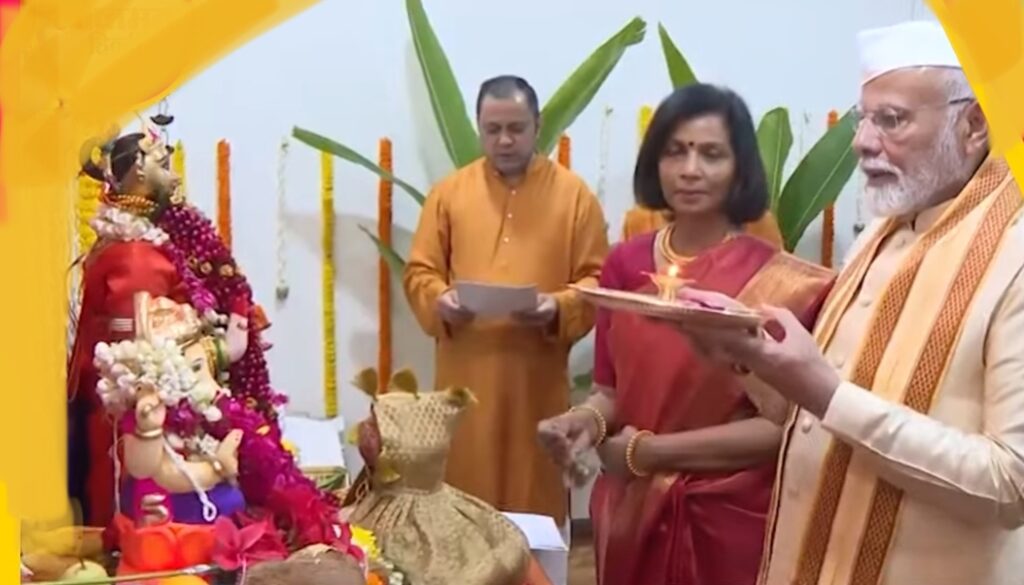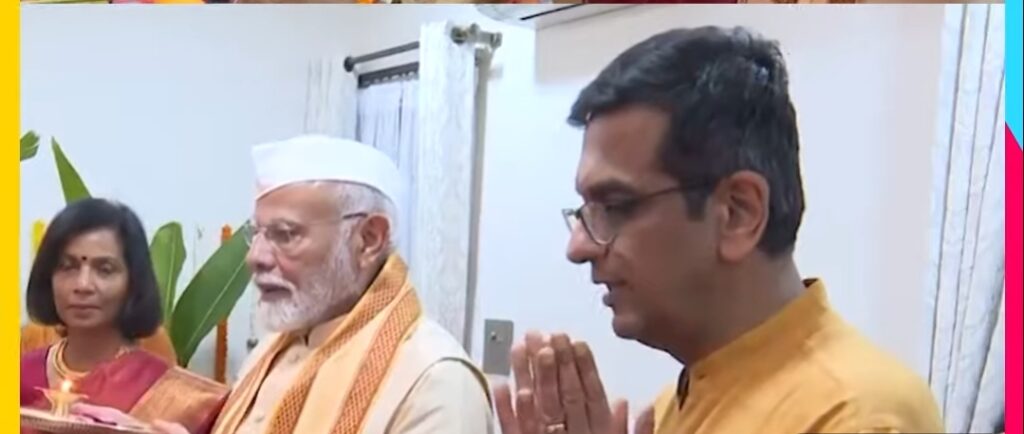

Chandrachud’s Contested Legacy: Judicial Reformer or Communal Echo?
A Career of Landmark Rulings Marred by Contradictions and Controversial Remarks
In a recent interview with Newslaundry’s Sreenivasan Jain, former Chief Justice of India D.Y. Chandrachud sparked outrage by calling the construction of the Babri Masjid a “fundamental act of desecration.” This statement, made shortly after his retirement on November 10, 2024, contradicts the 2019 Supreme Court Ayodhya verdict—widely attributed to him, though authored anonymously—which found no evidence that the mosque was built by demolishing a Hindu temple. The remark has reignited debate over his eight-year tenure on the Supreme Court, including two years as CJI, casting a shadow over a career that promised progressive reform but often delivered equivocation in politically sensitive cases. As investigative journalist Saurav Das described in a 2024 Caravan magazine cover story, Chandrachud’s tenure reflects “performative justice”—eloquent rhetoric on rights undermined by inconsistent actions.
Born in 1959, the son of Y.V. Chandrachud, India’s longest-serving CJI, Dhananjaya Yeshwant Chandrachud built an illustrious career. Educated at St. Stephen’s College in economics and mathematics, he studied law at Delhi University and earned a PhD from Harvard. After practicing at Sullivan & Cromwell and the Bombay High Court, he became a judge there in 2000, later serving as Chief Justice of the Allahabad High Court before joining the Supreme Court in 2016. His farewell speech in Bhutan, reflecting on his legacy and anxieties about history’s judgment, now seems prescient amid the backlash to his Ayodhya comments.
Championing Rights: Progressive Landmarks
Chandrachud authored several landmark judgments that positioned him as a defender of individual liberties. In 2017’s Puttaswamy case, he declared privacy a fundamental right under Article 21, emphasizing human dignity in a digital age. In 2018, he helped decriminalize homosexuality in Navtej Johar by striking down parts of Section 377 IPC, citing discrimination based on sexual orientation. His concurrence in Joseph Shine (2018) invalidated adultery laws, criticizing them for treating women as property and undermining gender autonomy.
Gender justice was a recurring theme. In Babita Puniya (2020), he mandated permanent commissions for women in the armed forces, rejecting stereotypes of women as the “weaker sex.” The 2018 Sabarimala verdict allowed women entry into the Kerala temple, dismissing age-based exclusions as non-essential religious practices.
In 2022, he extended abortion rights up to 24 weeks for unmarried women, broadening reproductive autonomy.
Other progressive rulings include dissenting in the Aadhaar case (2018), calling its passage as a Money Bill a “fraud on the Constitution,” and striking down the Electoral Bonds scheme in 2024 for violating transparency under Article 19(1)(a). In 2023, he quashed a government ban on a Malayalam news channel, criticizing “sealed cover” proceedings as antithetical to natural justice. These decisions, bolstered by lectures at global institutions like Harvard and Yale, earned him a reputation as a modernist jurist.
Yet, critics argue these were populist moves that garnered acclaim without challenging entrenched power. As Das’s Caravan piece suggests, Chandrachud often “sailed with the wind,” delivering judgments that won applause but sidestepped deeper systemic conflicts.
The Ayodhya Contradiction: Faith Over Evidence?
The 2019 Ayodhya verdict, which awarded the disputed 2.77-acre site to Hindus for a Ram Mandir while allotting Muslims five acres elsewhere, remains Chandrachud’s most polarizing judgment. The bench condemned the 1992 mosque demolition as illegal and found no evidence that the Babri Masjid was built by demolishing a Ram temple. Archaeological findings noted a 12th-century “underlying structure” of Hindu origin, but with caveats: no proof of demolition, a four-century gap, and no clear link to the mosque’s construction.
Chandrachud’s recent claim that the mosque’s erection was desecration, based on “archaeological evidence,” contradicts these findings. Critics, including Senior Advocate Prashant Bhushan, have accused him of aligning with Sangh Parivar narratives, especially after he revealed praying to God for inspiration in drafting the verdict. Allegations of bias in the archaeological report—criticized for haste, omissions, and questionable interpretations—further undermine his remarks. Observers appointed by the court even alleged manipulation to suggest temple pillars, claiming evidence pointed to a prior mosque. Chandrachud’s defence of the Gyanvapi mosque survey, despite citing the Places of Worship Act in Ayodhya, adds to perceptions of a “communal mindset.”
Political Equivocations and Judicial Inaction
Chandrachud’s tenure is marked by inconsistencies in high-stakes cases. In upholding the abrogation of Article 370 (2019), he deemed Jammu and Kashmir’s special status “transitory,” sidestepping sovereignty debates. In the 2023 Shiv Sena split, he criticized Maharashtra’s Governor and Speaker for unconstitutional actions but allowed the “illegal” government to complete its term. He deferred to SEBI in the Adani stock manipulation probe (2023) despite prima facie concerns, closing the case without scrutiny.
His handling of dissenters drew sharp criticism. In 2018, he dismissed calls for an inquiry into Judge B.H. Loya’s death, despite suspicions tied to a case involving a senior politician. While dissenting in favor of a SIT in Bhima Koregaon (2018), as CJI he oversaw prolonged detentions under UAPA for activists like Umar Khalid and G.N. Saibaba, ignoring the principle that “bail is the rule, jail the exception.” Senior Lawyer Dushyant Dave accused him of arbitrary case allocation, stalling sensitive matters like CAA challenges and hijab bans, and pandering to power.
Administratively, Chandrachud’s reforms were symbolic—reopening a court clinic, screening films, or unveiling a new Lady Justice statue—while pending cases surged from 69,000 to 82,000 in the Supreme Court and from 45 million to 51 million in high courts. His collegium appointed 17 Supreme Court judges, none women, despite his rhetoric on gender rights.
Personal Conduct and Post-Retirement Ambitions
Chandrachud’s media-savvy image, unprecedented for a CJI, fueled perceptions of ambition. His 2024 Ganpati puja with the Prime Minister, shared virally, blurred judicial-executive boundaries. Post-retirement interviews, including one days before demitting office, defended past actions rather than addressing pendency. Critics suggest these signal preparation for post-retirement roles, flouting norms against such positions.
In the 2024 Isha Yoga Centre case, he closed a habeas corpus petition based on adults’ statements of free will, avoiding scrutiny of influential figures. His refusal to recognize same-sex marriage (2023), despite earlier LGBTQ+ advances, highlighted limits to his progressivism, deferring to Parliament while dissenting mildly on civil unions.
A Legacy of Sound Over Substance?
Chandrachud’s tenure ended, as T.S. Eliot’s lines suggest, “not with a bang but a whimper.” Former Justice Madan Lokur noted he “hasn’t lived up to the reputation expected.”
Dave urged history to forget him, citing eroded judicial independence. His Ayodhya remarks, contradicting his own judgment, fuel communal tensions and undermine judicial credibility. Chandrachud’s career—eloquent in rhetoric, equivocal in action—leaves a fractured legacy, raising questions about whether justice in India remains blind or selectively sighted.
Hasnain Naqvi is a former member of the history faculty at St. Xavier’s College, Mumbai
All pictured credit social media


